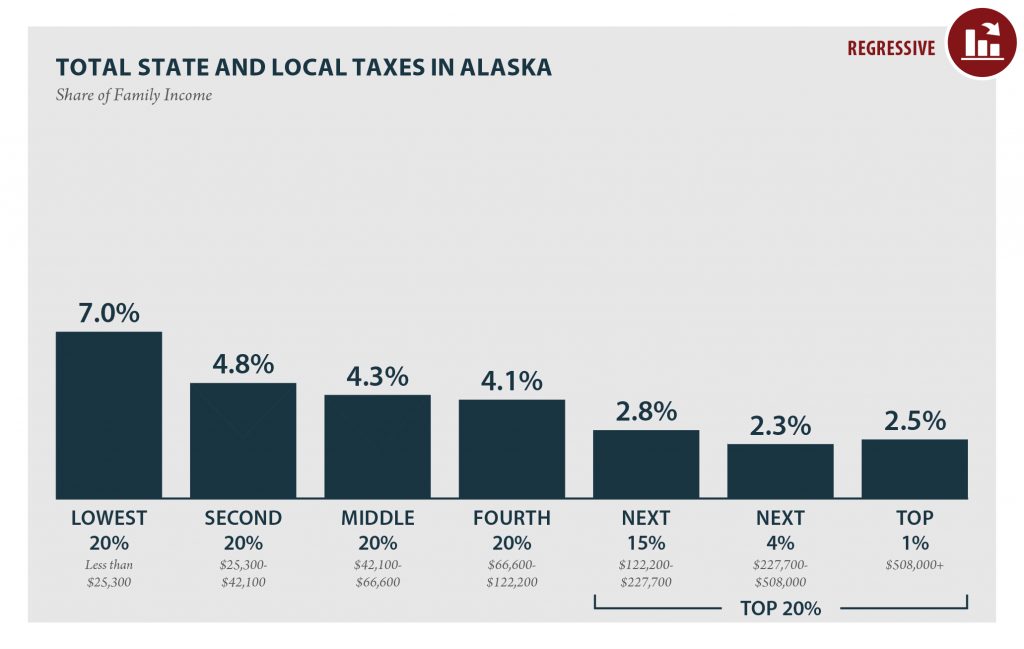Residents of several states are spending their palindrome week reading ballot initiatives forwards and backwards to decide whether or not to support them, including measures to improve education funding in California and Idaho, allow Alaska and Colorado to invest more in public services, and constitutionally prohibit income taxation in Texas. New Jersey lawmakers are giving the same thorough treatment to the state’s corporate tax subsidies. And advocates in Chicago, Illinois, have a bold proposal to flip the script on upside-down taxes there. But devotees of good policy and honest government in North Carolina won’t want to re-read yesterday’s news in any order.
— MEG WIEHE, ITEP Deputy Director, @megwiehe
Major State Tax Proposals and Developments
- ALASKA’s already unclear tax and budget situation got even murkier this month as BP—a “C-Corp” that paid the state an estimated $25 to $60 million in corporate income tax on its profits each year—sold its Alaska-based assets to company called Hilcorp. The state stands to lose all that revenue in the transaction because Hilcorp is an “S-Corp” whose profits are passed on to owners’ tax forms and subject to personal income taxes, which Alaska doesn’t have. Gov. Mike Dunleavy recently insisted on balancing the budget exclusively through funding cuts, and now the state’s credit rating has been downgraded, so some in the state are cautiously optimistic that leaders will seriously consider addressing these budget woes and the state’s upside-down tax code through a personal income tax. Meanwhile a ballot initiative drive to ensure the state gets its fair share of oil revenue is also underway.
- In a shocking move yesterday morning, NORTH CAROLINA House Republicans held a surprise, unannounced vote to override Gov. Roy Cooper’s veto of their budget bill with only half of lawmakers in attendance (they were told there would be no votes during the morning session). Without this move they would not have been able to achieve a 3/5 override vote with all or most members present. Cooper had vetoed the bill in June for underfunding education, giving more tax cuts to corporations, and failing to expand Medicaid.
State Roundup
- CALIFORNIA voters may decide on more than one major funding initiative for education in November as the California Schools Boards Association is looking into a $15 billion measure to raise more revenue for schools. The details of the proposal are not yet set, but there are indications that the measure will propose to increase the income tax on individuals and businesses with over $1 million. Another measure that would raise an estimated $11 billion for both education and local governments through a split roll property tax system has already qualified for the ballot.
- COLORADO voters will decide whether to allow the state to keep revenues in excess of TABOR caps this November when voting on Proposition CC. Under the measure, excess revenue would fund K-12 education, higher education, and transportation rather than be refunded to taxpayers. The Colorado Sun takes a deep dive on the issue.
- MASSACHUSETTS Gov. Charlie Baker is proposing to double the state’s income tax exemption for dependents.
- A new initiative has been filed in IDAHO to increase income taxes to fund public education. The initiative would restore the corporate income tax rate to 8 percent and increase tax rates on filers with over $500,000 ($250,000 if single). The measure is estimated to raise $170 million in new revenue. The measure will need 55,000 signatures to qualify for the November ballot.
- A coalition in Chicago, ILLINOIS, has proposed a set of progressive revenue raising options to address the city’s budgetary shortfall, address growing pension payments, and invest in new housing, health, childcare, education, and workforce initiatives. If all the proposed ideas were enacted, it would amount to an estimated $4.5 billion in new revenue a year.
- A new task force in KANSAS will begin working on tax reform issues later this month. Primary questions that will be addressed include responding to federal tax reform, taxing groceries, and ways to provide targeted property tax cuts.
- Although states offering sales tax holidays are increasingly in the minority, they’re still there. Last weekend LOUISIANA offered its 2nd Amendment sales tax holiday where guns, ammunition, and other hunting supplies are tax exempt. Some lawmakers in MICHIGAN have been proposing that the state enact a back to school tax holiday.
- Walmart is engaged in a legal dispute in LOUISIANA over tax liabilities incurred as an online marketplace provider. The outcome of the case may have significant implications for Walmart in all states it conducts business as well as other retailers that provide marketplace services.
- MAINE leaders are looking for ways to raise at least $100 million to finally fill the state’s transportation funding gap and repair its roads and bridges.
- A MICHIGAN lawmaker is proposing that the state extend its EITC to workers without children between the ages of 18 and 24.
- NEW HAMPSHIRE leaders hope to overcome their budget impasse by October 1 in order to meet a deadline to send $40 million in aid to local governments.
- NEW JERSEY lawmakers heard from experts on corporate tax subsidies this week, learning that the state’s subsidy programs don’t follow best practices and that even well-designed subsidies are dubious policies. One expert noted that “there is no evidence the number of economic tax incentives bear any relation to the broader performance of a state’s economy. And there is quite a bit of evidence that tax incentives often fail to achieve their stated goals and can have a negative impact on a state’s fiscal health.”
- It’s a good time to be NEW MEXICO with revenues from the oil industry driving budgetary surpluses. Given the extremely volatile nature of this revenue source, it’s a good thing that a contingent personal income tax rate increase is also anticipated to go into effect, since revenues didn’t exceed that of previous years by the required 5 percent. The state has more work to do to continue to shift its reliance to more sustainable and progressive revenue sources.
- A landmark lawsuit is going to trial in PENNSYLVANIA regarding how the state funds public education and resulting inequities that are perpetuated.
- In RHODE ISLAND, 10-year tax credits are being offered to draw wind businesses, the rich are not in fact fleeing the state (counter to popular conservative talking points), and economists reflect on the devastation of the last recession and what the state can do to be better poised for the next one.
- TEXANS in support of a ballot initiative that would prohibit the enactment of an income tax (which the state does not have) are concerned about confusing ballot language voters will face in November 2019.
- Among the tax reform issues under discussion in UTAH is the proposal to remove the constitutional guarantee that revenue raised from the income tax fund only K-12 and public education—a controversial recommendation in the state that makes the lowest per-pupil investments in public education.
- Also in UTAH, a recent poll shows the challenges lawmakers are up against when trying to adequately fund public investments such as infrastructure with strong opposition to suggestions to raise either the gas tax or create toll roads.
- WEST VIRGINIA lawmakers are planning to make progress on efforts to eliminate the state’s business and inventory tax in 2020. To do so requires amending the state’s constitution, which requires supermajority support in both legislative chambers and voter approval at the ballot. The tax currently generates around $400 million per year in revenues that support schools and local governments.
What We’re Reading
- The MAINE Center for Economic Policy breaks the news that, starting in 2020, low-income Mainers will at last pay a lower overall state and local tax rate than the highest-income households in the state.
- Voices for UTAH Children has released its policy positions on tax reform issues being debated in the state as part of a tax task force effort.
- VIRGINIA’s Commonwealth Institute reports that one-time rebate checks going out next month will miss the mark in big ways. More than 1 million residents—disproportionately families of color—will be passed by because the rebates will only go to people with positive income tax liability, ignoring the sales, property, and other taxes that these families pay at even higher rates than upper-income households. And the gimmicky rebates fail to do anything about the fundamental issues with the state’s upside-down tax code.
- The WISCONSIN Budget Project spells out the shortcomings of the tax policy choices advanced by the state legislature this past session, which include preserving tax loopholes that benefit the wealthy, missed opportunities for improvements in revenue collections, less inclusive tax cuts, and a failure to mitigate tax policies that hold back people of color.
- Promises from corporate leaders to focus less on profits mean very little if not accompanied by tax increases on the rich. Forbes has the story.
- Levying a soda tax on the amount of sugar contained rather than liquid volume would lead to greater health outcomes and economic benefits, a recent study finds.
- What would be required to successfully implement a wealth tax in the United States? Emmanuel Saez and Gabriel Zucman spell it out.
If you like what you are seeing in the Rundown (or even if you don’t) please send any feedback or tips for future posts to Meg Wiehe at [email protected]. Click here to sign up to receive the Rundown via email.





